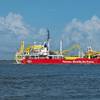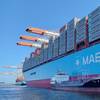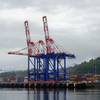For ports to cut emissions to ensure cleaner air and contribute to the battle against climate change, they first need to quantify emissions and then identify measures to reduce port-related emissions in a cost-effective way.
The on-going strategic partnership between the International Maritime Organization (IMO) -run GloMEEP project on energy-efficiency and the International Association of Ports and Harbors (IAPH) is helping selected countries to develop port emission inventories and subsequently draw up a port emission reduction strategy.
To-date, four countries have benefited from a new IMO training package, the latest being the Philippines – with a workshop in Manila (15-17 May).
The three-day course was undertaken by 35 Filipino maritime officials from maritime administrations, port authorities, port terminals and academia.
Participants will now be better equipped to quantify emissions in ports through the development of port emissions assessments (both ocean and land-based, including emissions from cargo handling equipment, trucks, rail etc.) and benefit from guidance on how to develop strategies for reducing emissions in port.
The event was hosted by the Philippines Maritime Industry Authority (MARINA) and run by a team of IMO consultants.
GloMEEP is a GEF-UNDP-IMO project aimed at supporting the uptake and implementation of energy efficiency measures for shipping, thereby reducing greenhouse gas emissions from shipping.
The GloMEEP Project is being executed by a dedicated Project Coordination Unit (PCU) established within the Marine Environment Division of IMO. IMO is a specialized agency responsible for safe, secure and efficient shipping and the prevention of pollution from ships.












